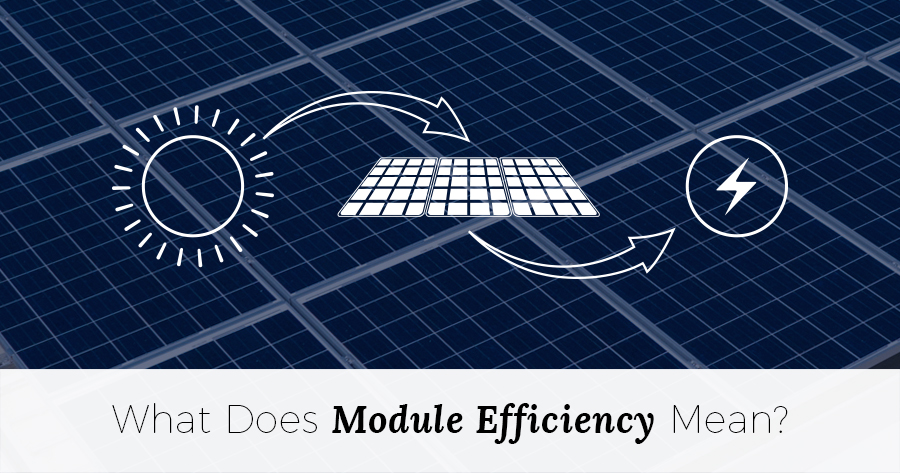What Does Module Efficiency Mean?

The Module Efficiency rating on your solar panel’s spec sheet measures the percentage of sunlight that hits your panel that is converted into usable electricity.
The higher the efficiency rating, the less number of panels you’ll need to make up a system that meets your energy requirements.
Why is Module Efficiency Not 100%?
Solar modules or panels use the light from the sun to generate their electricity. While the sun produces energy at a broad light spectrum, we’re currently only able to capture small percentages to convert into electricity using photovoltaic technology (PV cells).
The solar PV modules available today average efficiency of around 15% o 18%. (To put that on a scale for you, a traditional fossil fuel generator has an efficiency of 25 to 28%.)
Research and Development teams for various solar companies and scientific institutions are working on discovering ways to convert more of the light spectrum created by the sun into usable energy, to increase the efficiency of solar panels.
There are some experimental PV cells that boast an efficiency of nearly 40%. However, with this incredible technology also comes an incredibly high price tag.
Unless you’re working with a minuscule roof space and extremely high energy bills, we don’t think it’s worth the extra cost when compared to installing a high-quality panel with a decent efficiency.
Difference Between Module and Cell Efficiency
Module or Panel Efficiency refers to the efficiency of a single panel. Cell Efficiency, on the other hand, refers to a single solar cell, or the small square/rectangles your solar panel is made up of (standard panels have anywhere from 60 to 96 cells).
Overall Module Efficiency will always be lower than Cell Efficiency, due to the spaces between individual cells.
Why Module Efficiency Matters
Module Efficiency is a good indicator of overall panel quality. If a solar panel manufacturer can produce a panel with a high efficiency, it indicates they’ve invested heavily in research and development, and that your panel will last a long time.
For example, SunPower’s Maxeon 3 400W panel boasts an industry leading efficiency of 22.6%.
When Efficiency DOESN’T Matter…
Because Module Efficiency measures the power generated per square metre of your panel, all efficiency really means is that a less efficient solar panel will take up more room when compared to a more efficient panel. Wattage or the size of your panel, is what really matters when measuring how much electricity your panel with generate.
If you’re tossing up between two similar panels, don’t let Module Efficiency be your deciding factor. Consider the quality of the panels, associated performance and labour warranties, the manufacturer’s presence in Australia, and cost, before considering Module Efficiency.
The Bottom Line
Module Efficiency is only one of a combination of things to consider when deciding on the right solar panel for your home or business. At Infinite Energy, we recommend only considering modules with an efficiency of 15% or above, as an indication of overall panel quality. If the panel you’re looking at does not list its efficiency, we advise you to be very wary.
For more information on solar panels, you can read our blog on Power Tolerance here, and our blog on the difference between Max Power at STC and NOTC here. For more information on solar in general, feel free us a call on 1300 074 669, or request a no obligation callback by clicking here.


